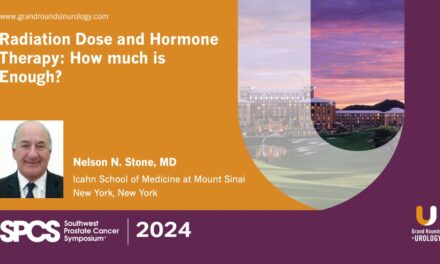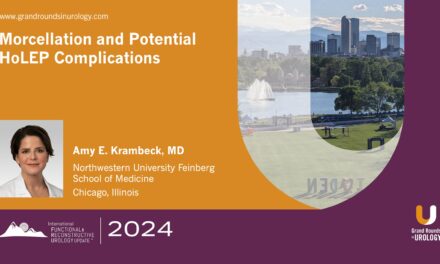Gopalkumar Iyer, MD, presented “Role of Immunotherapy for Upper Tract UC” at the 7th International Bladder Cancer Update on December 7, 2024, in Dallas, Texas.
This content is available free to the GRU Community. Login or create an account to view it.
How to cite: Iyer, Gopalkumar. “Role of Immunotherapy for Upper Tract UC” December 2024. Accessed Nov 2025. https://grandroundsinurology.com/role-of-immunotherapy-for-upper-tract-uc/
Role of Immunotherapy for Upper Tract UC – Summary
Gopalkumar Iyer, MD, explores the evolving role of immunotherapy in upper tract urothelial carcinoma (UTUC), emphasizing molecular distinctions from bladder cancer.
In this 11-minute presentation, Dr. Iyer shares results from multiple phase II trials, including PURE-02, that checkpoint inhibitors have comparable response rates between metastatic upper tract and bladder cancers. Early results from ongoing neoadjuvant ipilimumab-nivolumab trials suggest slightly improved outcomes. He transitions to adjuvant studies, including CheckMate 274 and Ambassador, which establish disease-free survival benefits for nivolumab and pembrolizumab post-nephroureterectomy.
Dr. Iyer moves to ongoing trials investigating CTDNA-guided adjuvant immunotherapy and the responsiveness of Lynch syndrome-associated UTUC to immune checkpoint blockade. A Memorial Sloan Kettering study evaluating dostarlimab for MMR-deficient tumors aims to eliminate the need for radical surgery, representing a potential paradigm shift.
Immunotherapy continues to evolve, necessitating further research to optimize treatment strategies for upper tract disease.
About the 7th International Bladder Cancer Update:
The International Bladder Cancer Update (IBCU) is a CME conference focused on the diagnosis and treatment of bladder cancer. The conference offers medical professionals an opportunity to listen to updates from, and interact with, expert international faculty to improve knowledge and determine best treatment practices to improve patient outcomes. IBCU encompasses expert lectures, interactive discussions, a panel roundtable, debates, and case presentations. It is physician-led, multi-supported, and designed for urologists, urologic oncologists, and other healthcare professionals involved in the treatment of bladder cancer.
For further educational activities from this conference, visit our collection page.
ABOUT THE AUTHOR
Gopakumar Iyer, MD,earned his MD at Vanderbilt University Medical School, completed a residency in internal medicine at the University of Michigan as well as a fellowship in medical oncology at Memorial Sloan Kettering Cancer Center. Dr. Iyer iscurrently a genitourinary oncologist and early drug development specialist serving as the section head for bladder cancer at Memorial Sloan Kettering Cancer Center. Dr. Iyer isa member of Memorial Sloan Kettering’s Bladder Cancer Oncogenomics Project, a multidisciplinary effort to discover the key genetic abnormalities that drive this disease. He specializes in research in and treatment of patients with genitourinary cancers, including bladder, prostate, kidney, and testis cancers.
Dr. Iyer’s laboratory research focuses on defining the genetic aberrations that characterize bladder cancer, thereby identifying mutations that may serve as targets for novel therapies. Specifically, alterations within the PI3 kinase/Akt/mTOR pathway are commonly found in bladder cancer, and efforts to understand the biologic effects of pharmacologic inhibition of this pathway are underway. Loss of the TSC1 protein, a negative regulator of mTOR activation, has been shown to contribute to dramatic sensitivity of bladder tumors to everolimus therapy. He is working to elucidate the mechanisms underpinning drug sensitivity and defining the pattern of co-alterations with TSC1 loss in bladder cancer using next-generation sequencing techniques.





